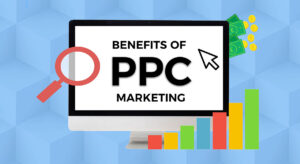
What is PPC in digital marketing?
PPC in digital marketing is an online advertising mode that allows a business to place ads on search engine results pages (SERPs), social media sites, and other websites. With PPC, advertisers bid on keywords and pay only when users click on their ad. When users click on the PPC ad, it brings them to the landing page of that particular business’s website. Along with this, a business can set the maximum budget for the ads. This means that PPC enables a business to work within its budget. Businesses can also constantly change the ad budget within the specified limits. Instead of this, with other types of advertisements, this is not possible.
There are some benefits of the PPC advertising technique discussed below:
1. Provides quick results.
Unlike other marketing methods, PPC can take a while to generate results. So this advertising strategy is designed to be fast. When someone launches a PPC campaign for their brand, they can see PPC ads running on search results or social media within a few hours. and in return, when the audience clicks on it, potential leads are generated immediately along with website traffic.
2. Targets the Right Audiences.
PPC in digital marketing ensures that your ads reach people who are interested in your products or services. It allows you to target audiences based on gender, location, interests, etc. For example, if a brand sells fitness equipment, PPC advertising will target only people who are interested in health and fitness.
3. Allows for budget flexibility.
If PPC is done in the right way, this advertising technique returns the most out of ad spend. It allows for complete control over the expenses of ad campaigns and adjustments as per the requirements and business goals, including performance. For example, if a business wants to cut back on ad spend, then it can. Similarly, if a business wants to increase and adjust the ad spend in particular seasons or for specific occasions, as an e-commerce website does during festive seasons, it can also be possible.
4. Quickly build brand awareness.
Brand awareness is all about how familiar people are with a brand and how well they recognize it. An effective PPC advertising campaign increases the chances of people choosing a particular brand over other rival brands as compared to purchasing the product through an organic search. When the ads appear at the top of search results on the search engine, target audiences will see the particular ad more and become more familiar with it, which may further increase brand awareness and generate more turnover quickly.
5. Precise tracking and analytics.
PPC advertising helps to track precise success metrics. When ads are running on Google, then Google Adwords can be used to track the success of a campaign and observe valuable insights on:
- Keyword relevancy
- Click-through rate
- Landing page
- Historical performance
Accordingly, make informed decisions based on this data and refine the ad campaigns along with the overall implemented strategy. For example, certain ads are getting lots of clicks but not many conversions. But if a certain keyword or ad placement is generating a lot of revenue with effective ad strategies that focus more on specific areas and maximize your return on investment (ROI),.
6. Facilitates Experimentation
Ad performance can be improved through A/B testing. Essentially, it helps to compare different versions of the particular ad and then recognize which one is performing better. By creating two different ads with element variations (such as headline, image, or call-to-action) and then figuring out which version generates more clicks or lead conversions, keeping track of experimenting with the elements is necessary because, without it, which element is responsible for the change in performance can’t be identified. And we were not able to maximize the campaign performance.
7. Real-time campaign adjustments
In other advertising methods, it’s very difficult to make any changes once your ad is out. But with PPC in digital marketing, campaigns are optimized in real-time and react quickly to changes in the market or customer behavior. Real-time campaigns help to take advantage of emerging trends or capitalize on sudden spikes in demand due to the availability of lots of features that allow advertisers to optimize campaigns based on real-time factors such as ad quality, competitor bids, customer conversion, etc.